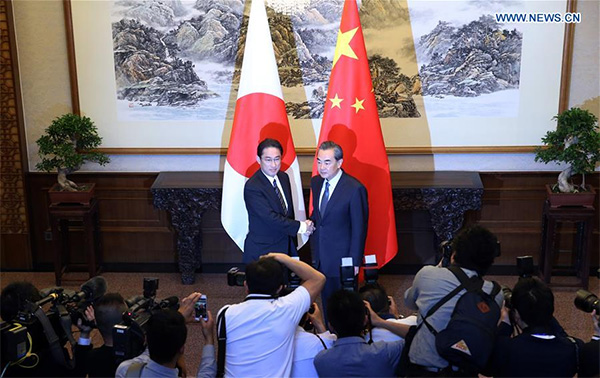Japan's self-made dual personality
(China Daily) Updated: 2016-05-03 07:48
 |
|
Chinese Foreign Minister Wang Yi (R) holds talks with Japanese Foreign Minister Fumio Kishida in Beijing, capital of China, April 30, 2016. [Photo/Xinhua] |
While more and more Chinese people are choosing Japan as a tourist destination, they have become increasingly aware that the Japanese government's deeds contradict its welcoming words.
On the one hand, it is common for us to hear that the Japanese government promises to treat historical issues honestly and then on the other hand see it remove from Japanese textbooks wartime atrocities such as the massacre in Nanjing in late 1937 and early 1938. And despite it repeatedly claiming to adhere to a peaceful development path, Japan has been passing new security bills aimed at removing the domestic legal obstacles to its Self-Defense Forces conducting overseas operations.
This ambivalence has also been reflected in Japan's policy toward China. On the one hand, it expresses the wish to improve ties with China, while at the same time choosing to point an accusing finger at Beijing on the South China Sea issue.
To a large extent this split personality has been caused by Japan's traditional policy practices and the present-day realities.
Its desire to retain the "glory" of being Asia's "leader" and its intention of remaining the US' top political and security ally in Asia have motivated the Japanese government to take advantage of the South China Sea issue to disturb the peaceful environment for China's development.
But with the recognition that China's rise is inevitable and Japan should adapt to such a trend, many Japanese enterprises and insightful people have not stopped exchanges and cooperation with China. They have realized that a wealthier and stronger China offers opportunities, rather than posing a threat, to Japan.
Japanese politicians should take seriously neighboring countries' misgivings about its ambivalence, offer an attentive ear to domestic appeals and take substantial actions to promote healthy development of ties with China.
-Overseas edition of People's Daily

I’ve lived in China for quite a considerable time including my graduate school years, travelled and worked in a few cities and still choose my destination taking into consideration the density of smog or PM2.5 particulate matter in the region.











